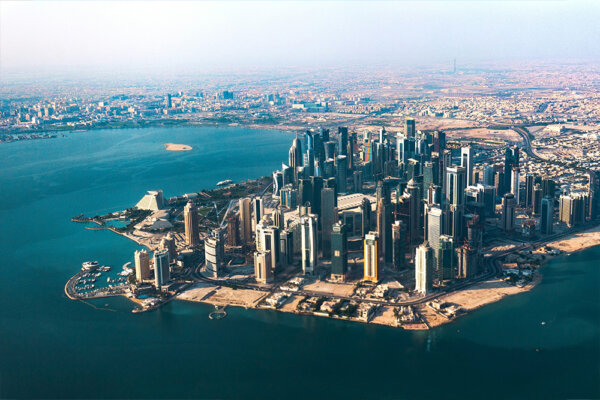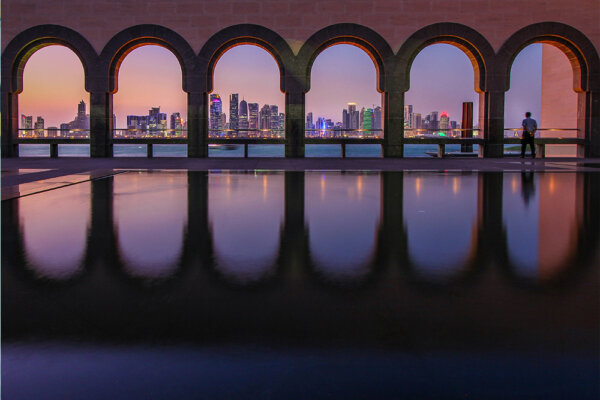Qatar is becoming known as a destination where expats can earn a very decent salary and have a high standard of living. Qatar is generally considered a safe country for expats. The crime rate is relatively low and the government of Qatar takes various measures to ensure the safety and security of residents and visitors.

The country has a well-developed infrastructure, effective law enforcement and a stable political environment. It is also a very conservative country, so learning and following the local laws and customs is crucial.
Preparing for Your Move
Once you have decided that Qatar is the destination for your family and you the first thing is to sort out the visa situation and find a place to live. Get the details here:
Understanding Visa and Residency Requirements
Tourists from 33+ countries, like the USA, Canada, Germany and Iceland, can grab a 14-day visa on arrival. But if you’re an expat aiming for a longer stay, a tourist visa just won’t do. Visa rules flip-flop often, so always get the latest info from your airline or embassy. Let’s go through the visas in Qatar:
Business and Work Visa for Qatar
A Qatari company can hook you up with a business visa for two weeks or extend it to four weeks or more. The employer will arrange this visa and residence permit, which needs the Ministry of Interior’s approval.
Family and Visit Visa
The family visa is required to sponsor spouses and kids. With the family visa, the immediate members can stay up to six months; other relatives get up to three months. Initial visas last a month and need to be renewed. The requirements for the family visa in Qatar include your and your family’s complete documents.
Exit Visa for Qatar
Expats need an exit visa and their sponsor’s approval for them to leave Qatar. Apply online or visit the office, but it must be in Arabic. Women and kids sponsored by their husbands or dads can skip this hassle.
Finding a Place to Live

Most expats in Qatar settle in villas within gated compounds or opt for apartments. These compounds range from cosy clusters to sprawling neighbourhoods with over 100 units.
To find a home, you can hire a real estate agent or take the adventurous route by driving around and asking guards about vacancies. Also, research the best places to live in Qatar. Here’s what to keep in mind:
- Lease Terms: Be prepared to hand over post-dated checks or a cash deposit when signing your lease.
- Furnishing: “Furnished” means basic furniture and appliances. “Semi-furnished” usually includes just air conditioning and some appliances.
- Furniture: Modern, simple furniture is rare. You can find several furniture stores in the country.
- Location: Choose a place close to your frequent destinations, like those near mosques.
- Maintenance: Look for accommodations with maintenance services to avoid the hassle of repairs. Properties with responsive management are worth the extra rent.
- Amenities: Most compounds offer security, pools and gyms. Larger ones also boast tennis and basketball courts, cafes, stores, dry cleaners, theatres and rentable common rooms.
Stand-alone villas, sometimes adjacent to others, are another choice. While some companies house employees in private compounds, the ongoing construction boom has opened up a wealth of housing options for those searching independently.
Setting Up Your New Home
Now that you have made it to Qatar, let’s set up your household. Here is a quick look at the living expenses in Qatar:
Qatar Housing Costs
Accommodation is the biggest part of living expenses in Qatar. For a single person, the estimated monthly cost is QAR 3,400. Moreover, if you want to bring your family, expect the cost for a family of four to be around QAR 12,100.
Rent can vary a lot depending on location, size and amenities. Qatar has plenty of options, from villas to apartments, to fit different needs and preferences. However, Doha is the most expensive city. That said, you can explore various rental apartments for under QAR 6000 in Qatar.
Plan For Monthly Expenses
Here’s an estimated breakdown of monthly expenses in Qatar for a small family of 2 to 3 people:
- Groceries: Brace yourself for QAR 1400 to QAR 1800 a month, depending on your culinary preferences.
- Utilities: Electricity and water bills range from QAR 400 to QAR 800 per month, depending on your apartment size and usage habits.
- Internet: If you need high-speed internet, that’ll be QAR 150 to QAR 240 a month, based on the provider and the speed you choose.
- Dining Out: If you love eating out, you can spend around QAR 400 to QAR 800 monthly on dining adventures.
- Transportation: From QAR 500 to QAR 900 per month, whether you’re fueling up the car, taking taxis or public transport in Qatar.
Safety and Security
Overall, Qatar is very safe. Most compounds have security and public places are filled with guards. Strict penalties for crime act as a strong deterrent. It is generally safe to walk around day or night.
Navigating Daily Life in Qatar
If you aren’t bringing over everyday necessities with you from your home country, it’s okay. There are several options here to help you get from A to B.
Transportation and Commuting
In Qatar, public transport is still finding its feet. Buses, with about 35 routes, are a budget-friendly option. However, most expats and locals use cars.
This is because the rental cars are super cheap and easy to get. If you have a Qatari residence permit, you can get a driving licence in Qatar. You must be at least 18 years old to learn to drive or hold a licence.
Moreover, traffic violations have hefty charges. So, before buying a used car, always check for fines on the Ministry of the Interior website.
Grocery Shopping and Local Markets
Grocery shopping in Qatar is easier with several top stores and malls. Some of the top grocery stores in Qatar include the following:
- Mega Mart
- Giant in Hyatt Plaza
- Carrefour
- LuLu Hypermarket
Banking and Financial Services
Qatar has many banks with convenient branches and ATMs, including Qatar National Bank (QNB), Doha Bank, Commercial Bank of Qatar and Al Khaliji.
Before opening a current account, you must establish residency, and the account initially needs to be in the employed male spouse’s name. Once the account is set up, it’s essential to add the wife’s name promptly to ensure she can access funds if necessary.
Cheques are seldom used in Qatar, except for rent and car payments, with only a few issued to account holders. For that reason, hold onto that credit/debit card. The local currency is the Qatari Riyal (QAR). Although Arabic is the official language, English is widely used in banking, making it more accessible for expats.
To open an account, you’ll need to provide:
- Passport
- Residency permit
- Employment contract
- Letter from your employer
Understanding these requirements will help you navigate Qatar’s banking system smoothly, ensuring your financial needs are met with ease.
Cultural Adaptation

Embarking on a journey to Qatar promises excitement and new experiences, but it’s vital to grasp the local customs and laws to make your stay truly remarkable. Understanding and respecting the following guidelines will ensure a harmonious and enjoyable stay in Qatar, making your experience both enriching and unforgettable.
Respect Traditions
Qatar is drenched in centuries-old Islamic traditions, a tapestry of cultural richness. The locals are quite hospitable and open-minded, yet their culture and values demand utmost respect.
Understand Social Ethics
Public displays of affection must be limited to married couples holding hands. Sexual relationships outside of marriage and homosexuality are strictly illegal, with harsh penalties. Offensive behaviour, language, or gestures can lead to fines, imprisonment, or deportation.
Alcohol and Pork Rules
Alcohol is a privilege for non-Muslims, confined to licensed venues or homes with a permit. Moreover, public drunkenness is a big no. Pork is available, but only to permit holders. Transport alcohol directly from purchase to home; avoid carrying it without a permit.
Drugs
There’s zero tolerance for drug possession, resulting in severe penalties, life imprisonment, or death. In fact, you must even be careful if you travel with prescribed medication and carry a doctor’s note with you.
Dress Code
Conservative attire is the norm. Shoulders and knees should be covered. Besides, one must dress sensitive to the Islamic culture.
Respect for Religion
Islamic values are highly revered. Disrespecting religious practices can result in severe penalties. During Ramadan, avoid eating, drinking, smoking or playing loud music in public during daylight hours.
Media and Internet Access
Certain media and internet sites are restricted to align with local cultural sensitivities. Films might be censored, and access to some websites could be limited.
Education and Childcare
When moving to Qatar with the family, most expats are worried about their children’s schooling. Here’s what you need to know:
Schooling Options for Expats
Doha boasts a plethora of international schools offering a variety of curriculums—American, British, French and Indian. These top-tier schools have tuition fees spanning from QAR 20,000 to a whopping QAR 80,000 per year.
If you are looking for something more budget-friendly, some private schools with a less international emphasis offer fees closer to QAR 10,000 annually. Remember, these figures often exclude extra costs like uniforms, books and transportation. Always check the schools’ websites for the most accurate information.
Some of the top schools include the following:
- American School of Doha
- ACS Doha International School
- The Hamilton International School
- Doha College
- Arab International Academy
- Belgravia High School Doha
- Swiss International School
- King’s College
- Nord Anglia International School
Childcare Facilities and Services
There are nearly 100 nurseries and childcare facilities all over Doha and other parts of Qatar where expats live. Rest assured that you have nothing to worry about as a working mother or father of a young infant. Many schools also offer childcare facilities after school hours.
Work and Employment
Starting a job in Qatar brings exciting opportunities and unique challenges. From securing work permits to understanding local customs, here’s everything you need to know to thrive in this environment.
Working Permit
To work in Qatar, you need a job offer before entering. Your employer handles all paperwork, including your initial visa. Once you arrive, they’ll start your work residence permit process. You’ll need essential documents like your passport and qualification certificates. You’ll undergo various tests: blood tests for HIV and TB, a chest x-ray and fingerprinting.
This process can take up to six weeks, during which you cannot leave Qatar. Your work permit is tied to your employer, meaning you can only work for them. To switch jobs, you need a no-objection certificate from your current employer.
Workplace Environment
In Qatar, the workweek runs from Sunday to Thursday. Offices have separate prayer rooms and colleagues leave multiple times a day to pray. Friday is Islam’s holy day, making parking a challenge due to high mosque attendance.
Women hold significant roles in Qatar’s workforce. Teaching, medical and professional services are common sectors for foreign women.
During Ramadan, government employees work shorter hours. Ramadan involves fasting from dawn to sunset: no food, drink, gum, or smoking. The start date changes yearly. Most restaurants close during the day, except in international hotels. At home, eating is fine, but at work, follow your colleagues’ practices. Breaking these rules is a criminal offence for everyone.
Networking and Career Development
In Qatar, networking is your golden ticket to landing your dream job. Here’s how to make it happen:
- Attend Events: Dive into industry-specific events, job fairs and networking gatherings. These are prime spots to meet key players and uncover job openings.
- Join Professional Associations: Get involved with organisations in your field. Attend their events, workshops and seminars to connect with industry pros and potential employers. Active participation is a good way to get noticed.
- Use Your Social Media: Connect with potential employers, industry leaders and colleagues. Keep your LinkedIn profile sharp, share relevant content and engage with industry posts. This strategy keeps you informed and on recruiters’ radars.
- Tap into Expat Groups: Expat communities and forums are gold mines of insights, support and networking opportunities. These groups offer leads and advice tailored to expats navigating Qatar’s job market.
By using these high-energy strategies, you’ll build a strong, dynamic network that opens doors to job opportunities and propels your career forward in Qatar.
Healthcare and Medical Services
Get your medical checkup done—blood test, chest x-ray, the works—within the first few weeks. This ensures you’re free from communicable diseases. Some expats, especially from certain countries, need this clearance before even landing in Qatar.
In 2022, Qatar rolled out a new compulsory health insurance scheme for all expatriates and visitors. Here’s what you need to know:
- Mandatory Coverage: GCC nationals and foreigners must have private health insurance during their stay in Qatar.
- Employer Responsibility: Employers are required to enrol their non-Qatari employees and their families in the mandatory health insurance plan.
- Sponsor Obligation: Sponsors of expatriates must provide basic health insurance coverage.
- Proof Required: Insurance proof is necessary for issuing or renewing residence permits.
- Additional Services: Employers can offer more extensive healthcare services beyond the basic plan, depending on the contract.
Your employer is obligated to provide a basic insurance plan for you and your family. You can either negotiate for better coverage with your employer or purchase an additional plan yourself. For international health insurance, compare different providers to find the best deal.
Leisure and Recreation
A weekend with friends in Qatar often means relaxing by the pool in the sun, but if you’re feeling adventurous, there are plenty of other options.
One exciting activity is heading out into the dunes in a big four-wheel-drive vehicle. Exploring the desert and staying overnight in a desert camp under the stars can be an unforgettable experience.
For history buffs, Qatar offers a rich array of museums and architectural sites. The Museum of Islamic Art and Katara Cultural Village provide deep insights into local Islamic traditions and ways of life.
The big malls in Qatar—Villaggio, Landmark and City Center—are more than just shopping spots. They offer movie theatres (with English language films, though sometimes edited), ice rinks and indoor amusement parks with Ferris wheels and roller coasters.
Going to the mall is a favourite activity, especially in the evenings and on weekends and even more so during the hottest months. Just be ready for busy parking lots on weekend nights.
Staying Connected
Qatar’s expat community is brimming with social opportunities! Large compounds frequently host resident gatherings and hotels throw themed parties—think beach, reggae and disco nights.
Doha has transformed from a sleepy pearl trading port to a dazzling, modern metropolis with nearly 3 million people. Expect a vibrant mix of cultures, perspectives and customs at every turn. You can easily find friends by joining this expat network.
Moreover, connecting with other families is a breeze through school events and a wide range of youth sports activities like swimming, football, rugby, baseball/softball, ice hockey and scouts. These are run by both schools and external organisations.
While the kids are in school, mums can dive into countless expat coffee and social groups. The options are so plentiful, you could be sipping coffee and chatting with new friends every single day of the week!
FAQs
1. Is Qatar a Good Place to Live?
Yes, Qatar is a good place to live with friendly nationals. However, you must respect the culture and norms.
2. Can You Wear Shorts in Qatar?
Yes, you can wear shorts in Qatar. However, they must be below knee length. In public places, you can’t wear shorts.
3. Can I live in Qatar permanently?
For permanent residency, you must stay a minimum of 20 years, be fluent in Arabic and have a zero criminal record. This permanent residenceship comes with free education and healthcare. Besides, one can own a 100% business.
Living in Qatar is an exhilarating adventure. This country blends modern luxury with rich cultural traditions. From its stunning skyline and world-class amenities to its lively expat community and vibrant food scene, there’s something for everyone.
For more details on the Qatar lifestyle, keep following the Property Finder blogs.



